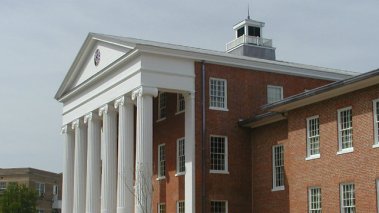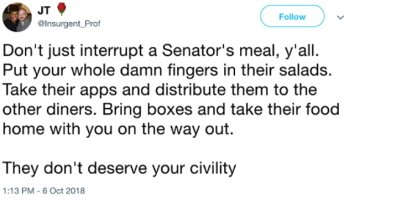Table of Contents
Calls for censorship at Ole Miss over professor’s salad tweet must be rejected

Officials at the University of Mississippi must resist continued calls to discipline a faculty member for a controversial tweet he wrote earlier this month — even where those calls come from elected officials.
On Oct. 6, in apparent frustration with the Senate Judiciary Committee on the day Brett Kavanaugh was sworn in as a United States Supreme Court Justice, Ole Miss professor James Thomas tweeted from his @Insurgent_Prof account:

Thomas’s tweet earned immediate backlash, with some calling for his termination.
Criticism was also swift from Chancellor Jeff Vitter, who wrote a Facebook post stating that a “recent social media post by a UM faculty member did not reflect the values articulated by the university, such as respect for the dignity of each individual and civility and fairness.” Vitter further wrote that “I urge all members of the Ole Miss community to demonstrate civility and respect for others and to honor the ideal of diversity of thought that is a foundational element of the academy.”
Vitter’s statement is an example of how an institution can respond to provocative speech: to respond with its own speech instead of censorship — a path that FIRE often advocates. In his statement, Vitter wrote that he “passionately supports free speech.” We hope that means that Ole Miss acknowledges and will continue to defend Thomas’s free speech rights.
However one feels about the merits of Thomas’s tweet, even if one believes it is noxious, it remains protected speech because it does not rise to the level of “incitement,” which would remove the speech from First Amendment protection.
As the Supreme Court stated in 1969 in Brandenburg v. Ohio, the government may not “forbid or proscribe advocacy of the use of force or of law violation except where such advocacy is directed to inciting or producing imminent lawless action and is likely to incite or produce such action.” In this instance, was Thomas’s tweet “likely to incite” people, right away, to put their “whole damn fingers in [a Senator’s] salad”?
The answer to that question is a resounding “No.”
While professors may face caustic public criticism for their views, they may not be punished by their employers (at least at public institutions of higher education), as we’ve noted time and time again. The First Amendment exists not to protect speech we like, but speech we dislike; as the Supreme Court once explained: “That the air may at times seem filled with verbal cacophony is, in this sense not a sign of weakness but of strength,” because “governmental officials cannot make principled distinctions” between what speech is sufficiently inoffensive, and the “state has no right to cleanse public debate to the point where it is . . . palatable to the most squeamish among us.”
Unfortunately, among those calling for Thomas to be disciplined include at least one elected official in the state of Mississippi. FIRE is always disappointed to see elected officials — who generally swear to defend and protect the federal and/or state constitutions — call for censorship, which would violate an individual’s constitutional rights. Elected officials should remember that while they may not like the professor’s viewpoint, his speech is fully protected by the U.S. Constitution.
The University of Mississippi must continue to resist calls to censor Thomas, and stand for the free speech rights of its faculty.
Recent Articles
FIRE’s award-winning Newsdesk covers the free speech news you need to stay informed.

Texas tramples First Amendment rights with police crackdown of pro-Palestinian protests

Here’s what students need to know about protesting on campus right now

Kansas takes a stand for intellectual freedom
